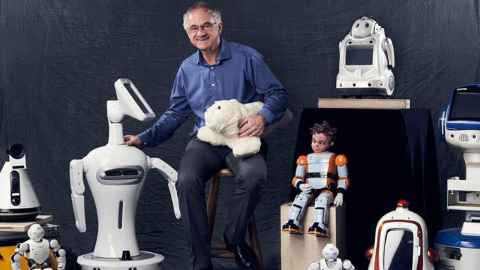Robotics Professor appointed National Science Challenge Deputy Director
7 February 2017
Electrical and Computer Engineering Professor Bruce MacDonald has been named the Science for Technological Innovation National Science Challenge’s Deputy Director.

The upcoming position follows Faculty of Engineering colleague Professor Margaret Hyland’s resignation from the initiative upon her appointment to Chief Scientist at the Ministry or Business, Innovation and Employment (MBIE). Professor MacDonald will be collaborating with the Challenge’s new Director, Professor Sally Davenport from Victoria University’s Business School.
He states that the Challenge, which involves the collaboration of over 100 researchers throughout universities and research institutes across the country, provides great opportunities for New Zealand’s future. “Our vision is to step up the engagement between researchers and industry for advanced technologies within the Challenge, and ideally spreading more widely”.
Professor MacDonald was an integral part of many milestones within the University’s Department of Electrical and Computer Engineering, including the development of Computer Systems Engineering as a specialisation. He is perhaps most widely-known for starting the University’s Robotics Laboratory, now known as the Centre for Automation and Robotic Engineering Science (CARES), a research group with comprehensive, multidisciplinary, and internationally-recognised expertise in a variety of robotics applications.
His expertise lies in human-robot interaction and software systems, and he has led major interdisciplinary research projects in the development of assistive robots in sectors such as healthcare and agriculture. Professor MacDonald has additionally undertaken the role of theme leader for Sensors, Robotics and Automation as part of the National Science Challenge management team since its inception.
The Science for Technological Innovation, hosted by Callaghan Innovation, is a ten year, multimillion dollar investment to enhance New Zealand’s capacity to grow its economy through engineering and the sciences. It is one of 11 National Science Challenges supported by the MBIE to provide a stronger strategic approach to the nation’s investment in the sciences. Professor MacDonald suggests, “the exciting thing about the Challenge is that everything we are doing is new, including all our research and capacity development programmes, and even the way we are doing it as researchers”.
Taking on the role as Deputy Director does not stray far from his a long-term goal: to design intelligent robotic assistants to improve the quality of people’s lives, subsequently allowing science and technology to be central to our everyday routines. He adds, “one of the biggest challenges is getting our message out to all New Zealanders. We want people to be talking about what we are doing, how we are helping them, and suggest how they can be working with us”.